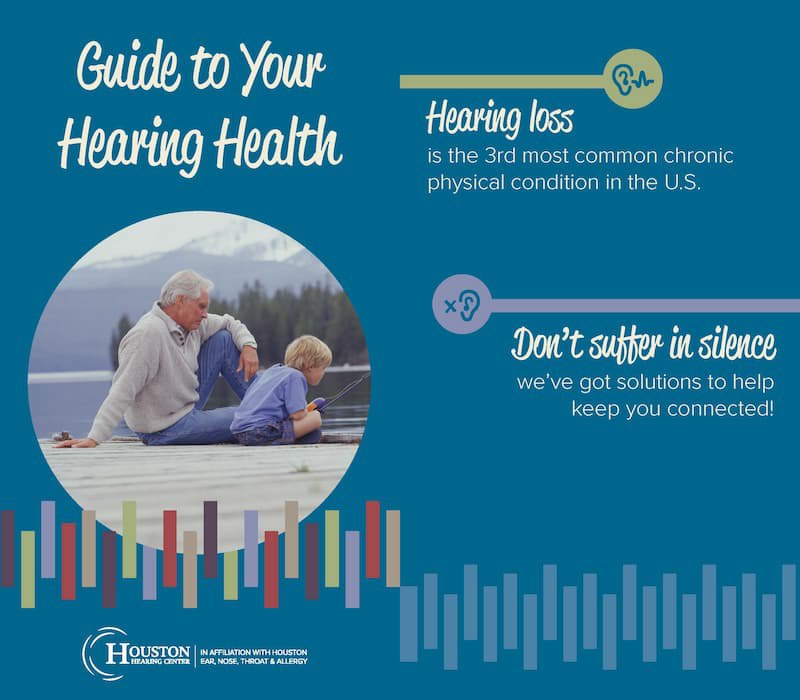Expert Care for Your Hearing Loss
Get personalized treatment for all of your hearing loss needs

Hearing Loss
Hearing loss is one of the biggest health concerns in the U.S. It is the third most commonly reported physical condition, following arthritis and heart disease. It affects roughly 20 percent of the American population and people of all ages.
What Are the Symptoms of Hearing Loss?
Common symptoms of hearing loss are:
- Friends or family say you turn the television or radio up too loud
- You struggle to understand speech, especially in noisy environments
- You have difficulty hearing people on the phone
- A feeling that you can hear, but not understand
- You have difficulty localizing where sounds are coming from
- You often ask people to repeat themselves
- You find yourself avoiding social situations
- You find yourself withdrawing from conversations
- You have ringing in the ears (Tinnitus)
- Ironically, some sounds seem too loud, known as "recruitment"
Hearing loss is a progressive condition that worsens over time. Symptoms often appear so gradually that you may not even notice them. Often, family and friends may be the first to notice hearing difficulty. If you suspect hearing loss in yourself, or someone close to you, Contact a trusted Houston Hearing Center audiologist for an appointment. Early intervention is key, the sooner you seek help, the better your outcome will be.
How Is Hearing Loss Diagnosed?
In order to diagnose hearing loss, your doctor will review your medical history, discuss your symptoms, and give you a physical examination. Our audiologist will conduct a battery of hearing test to determine the location and nature of hearing loss. Thorough testing can provide information about the function of your ear canal, the middle ear, the inner ear, and your ability to discriminate speech. Treatment will depend on your type and degree of hearing loss.
What Are the Types of Hearing Loss?
Hearing loss is classified by what part of the hearing system is affected. The three basic categories of hearing loss are sensorineural hearing loss, conductive hearing loss and mixed hearing loss. Here is what you should know about each type.
Sensorineural is the most common type of hearing loss. It is a permanent hearing loss that occurs when there is damage to the tiny hair-like cells of the inner ear or the auditory nerve itself, which prevents or weakens the transfer of nerve signals to the brain. These blocked nerve signals carry information about the loudness and clarity of sounds. It can be caused by any of the following:
- Exposure to loud noise
- Aging (presbycusis)
- Head trauma
- Virus or disease
- Autoimmune inner ear disease
- Heredity
- Malformation of the inner ear
- Ménière’s disease
- Otosclerosis
- Acoustic Neuroma’s
Sensorineural hearing loss can rarely be reversed by medical or surgical procedures. Most often it can be helped with hearing devices.
Conductive hearing loss occurs when there is an obstruction or damage to the outer or middle ear that prevents sound from being conducted to the inner ear. Conductive hearing loss may be temporary or permanent. It can be caused by any of the following:
- Ear infection
- Fluid in the ears
- Malformation or abnormalities of the outer or middle ear
- Impacted earwax
- Foreign object in the ear
- Allergies
- Perforated eardrum
- Otosclerosis
- Abnormal growths that form within the middle ear, such as cholesteatomas
Often, conductive hearing losses can be treated with a combination of surgical intervention, medications, removal of wax or foreign objects in the ear canal, and hearing devices.
Mixed hearing loss is a combination of Conductive and Sensorineural hearing loss. Treatment might involve a combination of medication, surgery, and hearing devices.
There are many causes of hearing loss in children and adults. Our medical and hearing healthcare professionals can evaluate and determine the proper treatment plan for each patient on an individualized basis.
Hearing Loss Prevention
Protecting your ears is the key to hearing loss prevention. If your job exposes you to hazardous noises, make sure proper safety equipment is provided, and that it meets state and federal regulations. Hearing protection – earplugs and earmuffs – is essential when working around loud equipment. It’s always a good idea to bring along earplugs if you’re participating in a noisy recreational activity (e.g., a football game or rock concert), as well.
At home, limit your exposure to noisy activities, and keep the volume down – on the television, stereo and especially when it comes to personal listening devices. Prevent other types of hearing loss by refraining from inserting cotton swabs or other objects into your ears, blowing your nose gently through both nostrils and quitting smoking. Studies show those who use tobacco are more likely to suffer from hearing loss.
Regardless of your age, have your hearing tested regularly. Early detection is key. While noise-related hearing loss cannot be reversed, you can still take steps to avoid further damage to your hearing.
Call Houston Hearing Center at 281-699-5609 for more information or to schedule an appointment.
Free 10 Page Guide to Your Hearing Health
Boost your hearing health with our guide: types of hearing loss, causes, prevention, treatment & lifestyle tips. Download now! 